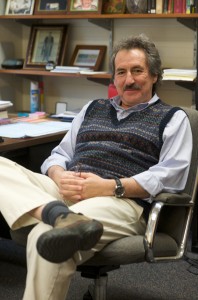
Chemical engineering professor Chimowitz wrote his first fiction book.
I was surprised when I searched for other books that UR Professor Eldred H. Chimowitz had written and “Introduction to Critical Phenomena in Fluids” came up. Apparently, Chimowitz’s devotion to science didn’t hinder him from dipping into the world of literature with his debut novel “Between the Menorah and the Fever Tree,” which tells the coming of age story of a Jewish teen growing up in Africa.
“This is my first work of fiction,” Chimowitz said. “I always wanted to write, but for the joy of it. I’d hate to do it for a living. That’s why I ended up in engineering. I wanted to bring an era to life, the Jewish-African experience, from the point of view of a young boy and how those experiences shaped his life, all the way to coming to America.”
The novel traces its main character, Chungle, in his travels from Rhodesia to Cape Town and subsequently New York. In addition to this, we meet various characters in his life. Being a Jew of Russian descent living in 1960’s South Africa, Chungle faces identity crisis in adolescence until he meets Jake.
Jake becomes Chungle’s best friend and is a representative of his generation — he loves rock music and always makes dirty jokes. The other crucial person in Chungle’s life is the beautiful Emma. Chungle meets Emma in college and falls head over heels for her. Their transient love left a mark on Chungle’s youth and sticks with him for the rest of his life, stimulating him to explore the meaning of life from time to time.
Set in the frantic 1970’s in South Africa, Chungle and Jake’s lives seem trivial against the backdrop of blood, power and bedlam — their world was disintegrating in front of their eyes. Being skeptical of any ideology, Jake and Chungle left South Africa after their graduation from high school.
“I don’t have enough of the Jesus thing in me, dude, to stay here. The country is a mistake from the beginning,” Jake said at one point.
Exhausted by the problems of friendship, love, life and an unfathomable world, Chungle decides to leave everything behind and begin life in a country with far less historical burden, America — but he soon finds himself completely disillusioned.
“Too often we arrive at point ‘b,’ find it all wrong and ask to go back to point ‘a’ and start over again. Meanwhile, stuff changes at ‘a.’ It’s all pre-arranged so that you never win,” Chungle said.
It reminds me of a metaphor that anything you pursue in life is like a besieged fortress. The insiders want to get out, and the outsiders want to get in. Chimowitz wrote his book in this fashion after taking inspiration from other similarly cynical authors such as J.D. Salinger, Philip Roth and James Joyce.
The most fascinating thing about the book is that despite all the differences in experiences, we can all relate to the self-doubt, cynicism and emotional turmoil Chungle goes through. We all have been there — that place where we mock ourselves and everything around us and the world.
We all have at one point asked ourselves what the real purpose is for living in this sometimes not-so-pleasant world. It’s this awareness that puts us in anxiety and agony. The pain is so vividly in existence that neither the author nor we can deny it’s been part of youth. Should we live numb in order to avoid the pain? What comes next after we disparage all things people in the world hold on so dearly to? What remains in life that is worth our effort and devotion? Chungle is still on the road in search of an answer.
Wang is a member of the class of 2012.